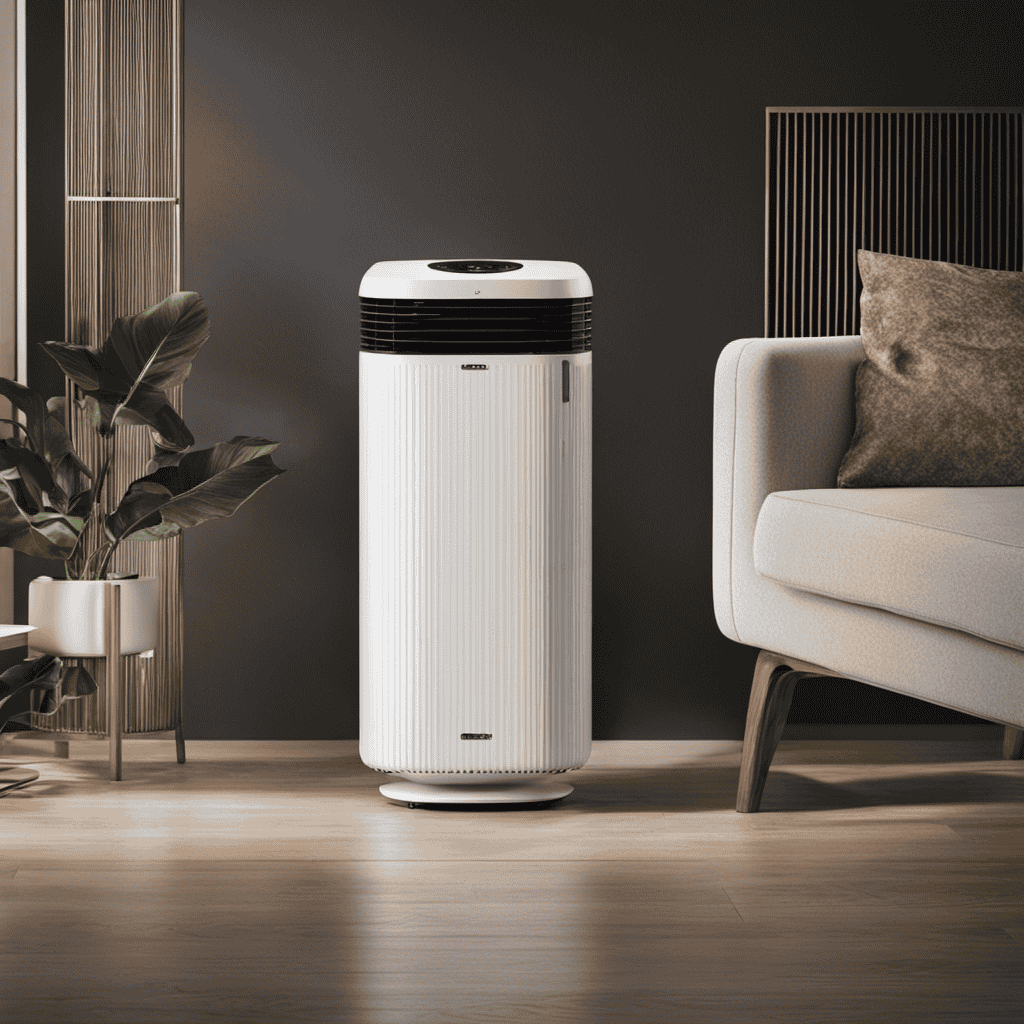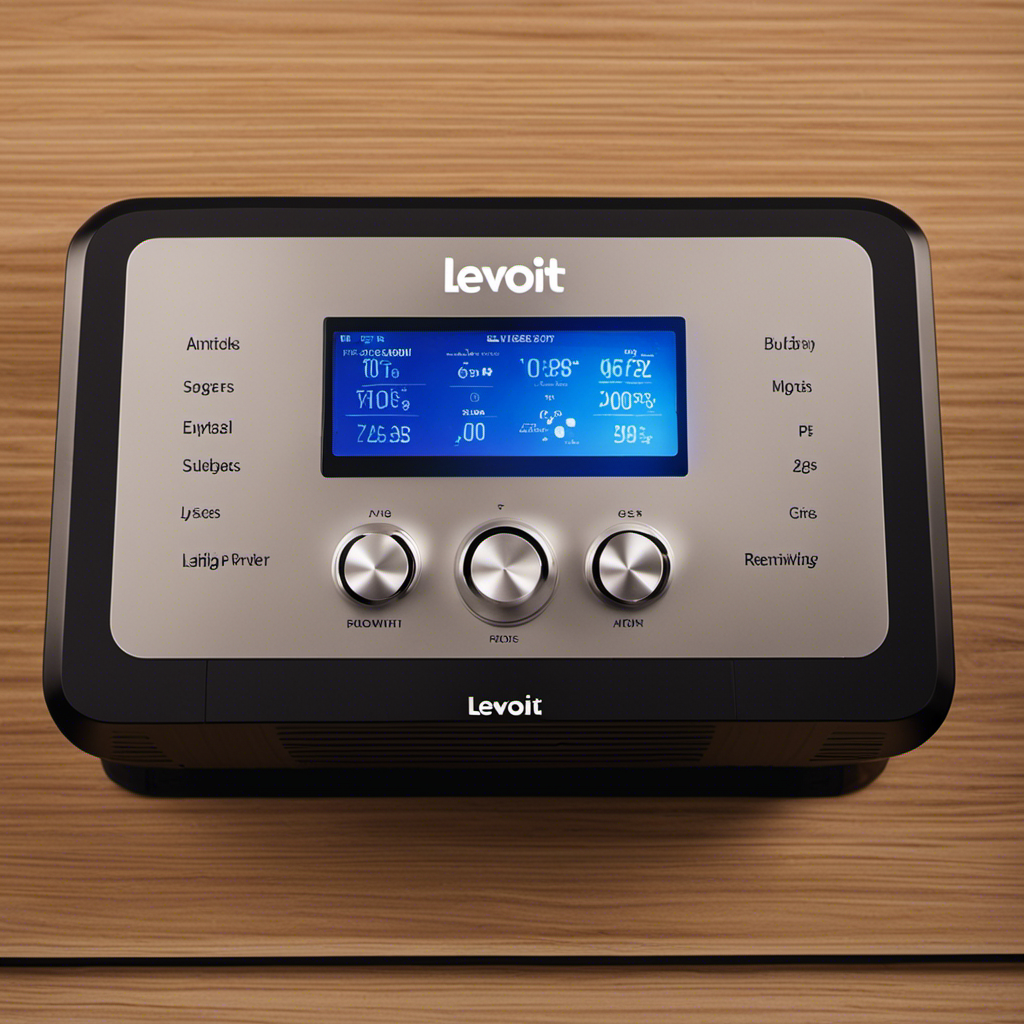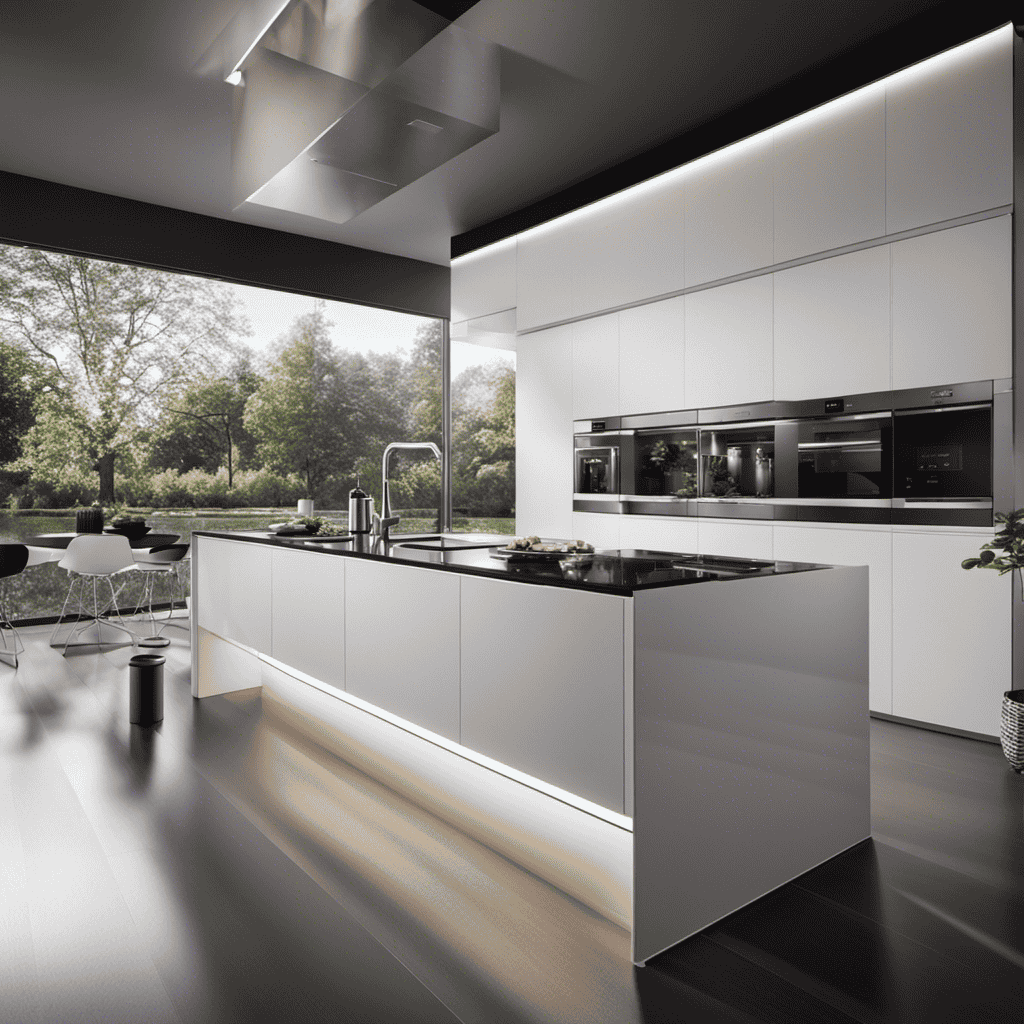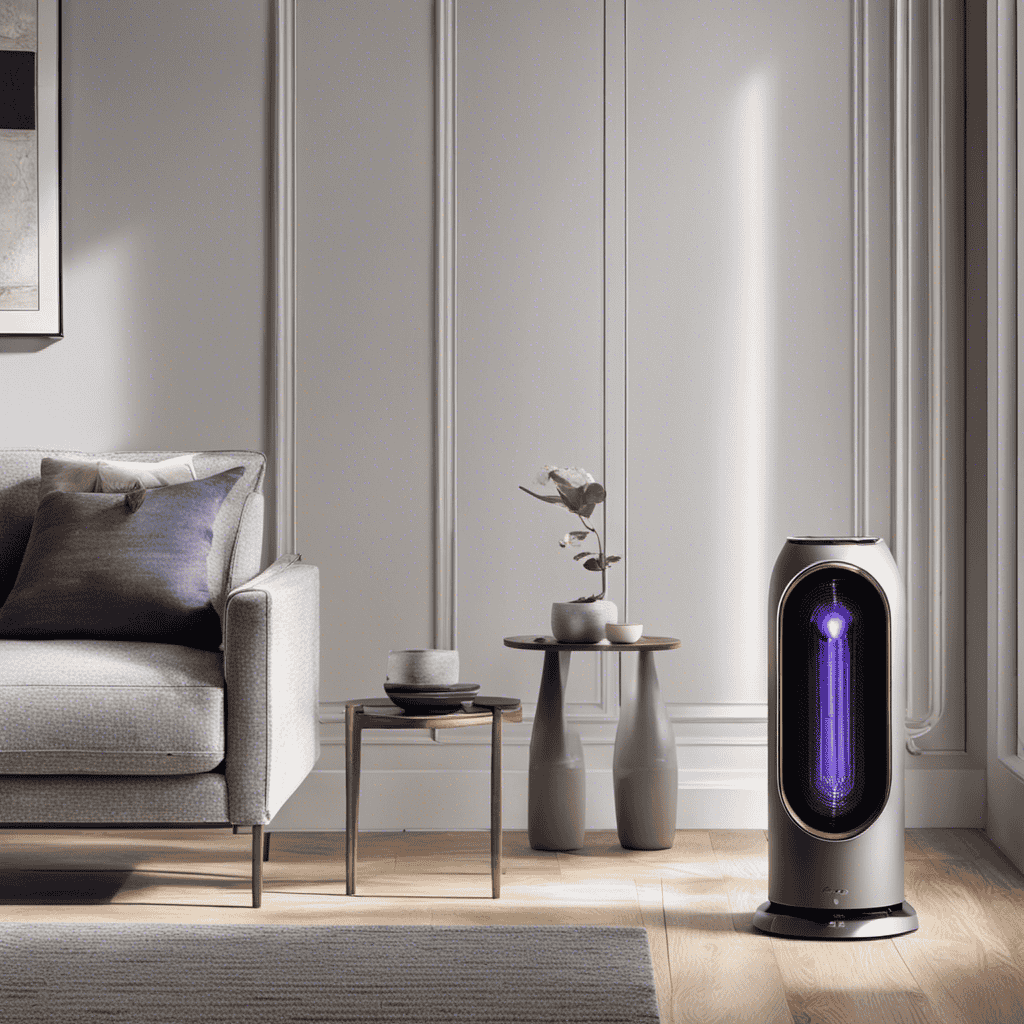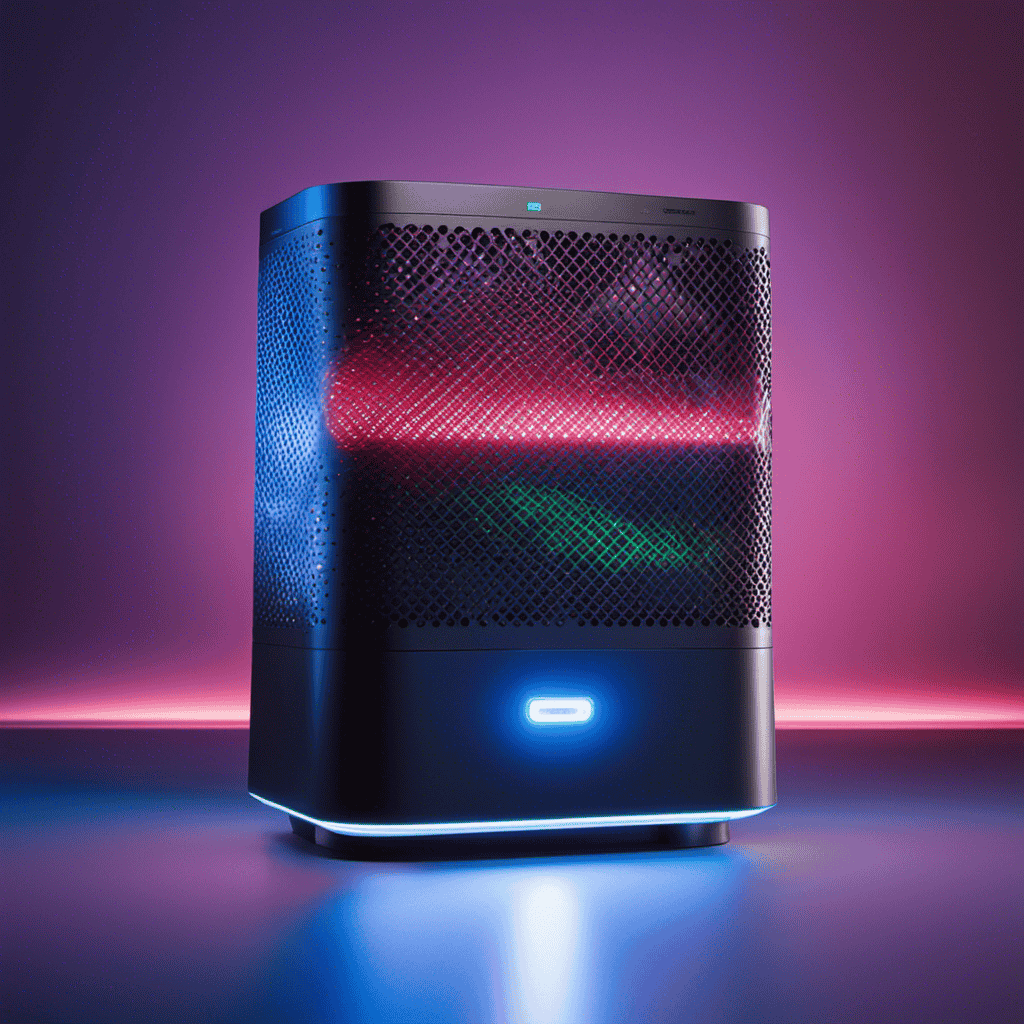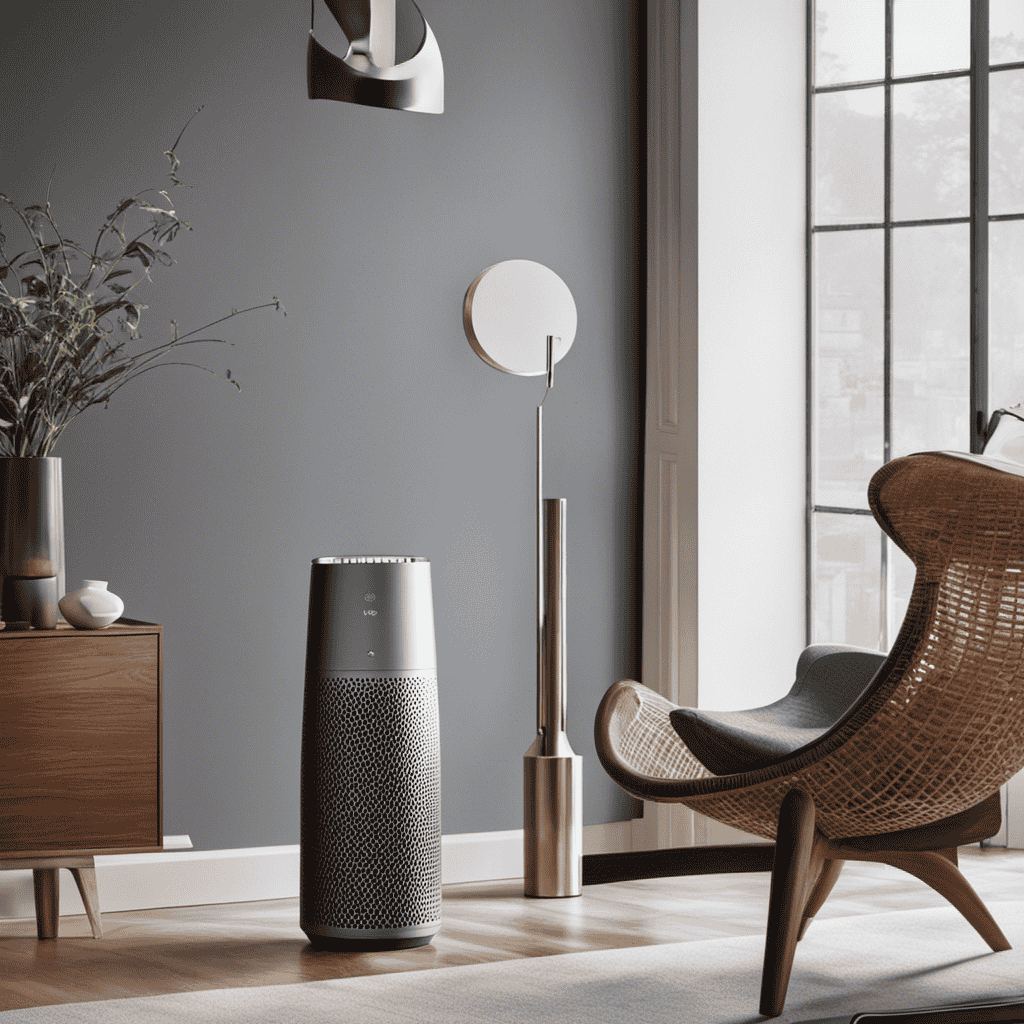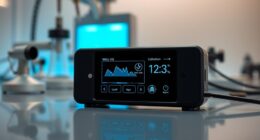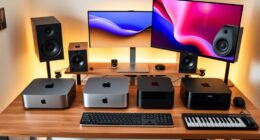Did you realize that the air within our homes can be up to five times more contaminated than the air outside? This is where air purifiers play a crucial role.
In this article, I will explain how air purifiers work and the technology behind them. We will delve into the key components, like filters, and explore the different methods used to remove particles and allergens from the air.
Additionally, we will discuss the importance of air circulation and factors to consider when choosing an air purifier.
Let’s dive into the fascinating world of air purification!
Key Takeaways
- Air purifiers utilize filtration, ionization, and UV-C light to capture and eliminate harmful particles.
- Different types of filters, such as HEPA filters and activated carbon filters, have specific functions in removing different types of particles and odors.
- The purification process involves capturing airborne particles through filtration, removing odors and chemical pollutants through activated carbon adsorption, and causing particles to clump together through ionization for easier capture.
- Regular maintenance and cleaning, including replacing filters, is necessary to ensure optimal performance and air quality.
Understanding the Technology Behind Air Purifiers
To understand how an air purifier works, you need to know the technology behind it.
Over the years, there have been significant advancements in air purifier technology, improving their effectiveness in removing pollutants and allergens from indoor air.
Air purifiers work by utilizing various mechanisms, such as filtration, ionization, and UV-C light, to capture and eliminate harmful particles.
The most common type of air purifier uses a combination of filters to trap particles like dust, pollen, and pet dander. These filters are designed to capture even the smallest particles, ensuring cleaner air.
Some air purifiers also incorporate ionizers, which release negative ions to attract and neutralize airborne pollutants.
Additionally, UV-C light technology is employed to kill bacteria and viruses.
Understanding these advancements and the effectiveness of air purifiers sets the stage for exploring the key components of an air purifier.
Key Components of an Air Purifier
When discussing the key components of an air purifier, it is important to understand the different filter types and their functions.
Filter types, such as HEPA filters, activated carbon filters, and UV filters, each play a crucial role in removing various pollutants from the air.
Additionally, a thorough purification process breakdown is necessary to comprehend how these filters work together to improve air quality.
Lastly, it is essential to delve into the functions of key components like fans, sensors, and control panels, as they contribute to the overall effectiveness and efficiency of the air purifier.
Filter Types Explained
If you’re looking for an air purifier, you’ll want to understand the different types of filters available. Filters are an essential component of an air purifier as they trap and remove pollutants from the air. There are several types of filters commonly used in air purifiers, each with its own benefits and maintenance requirements.
Here is a table summarizing the different types of filters and their characteristics:
| Filter Type | Description |
|---|---|
| HEPA | High Efficiency Particulate Air filters are highly effective at removing small particles such as dust, pollen, and pet dander. They require regular replacement to maintain optimal performance. |
| Carbon | Activated carbon filters are excellent at removing odors and volatile organic compounds (VOCs). They need to be replaced periodically to ensure effectiveness. |
| Ionizer | Ionizing filters charge particles in the air, causing them to stick to surfaces. These filters require cleaning to remove accumulated particles. |
| UV-C | Ultraviolet-C light filters kill bacteria and viruses. They do not require replacement but need regular cleaning. |
| Pre-filter | Pre-filters capture large particles like hair and dust, prolonging the lifespan of other filters. They need to be cleaned or replaced regularly. |
When choosing an air purifier, it is important to consider the specific needs of your environment and the maintenance requirements of different filter types. Regular maintenance, including filter replacement or cleaning, is crucial to ensure the air purifier continues to effectively clean the air in your space.
Purification Process Breakdown
Understanding the purification process breakdown helps you choose the most effective air purifier for your needs.
Air purifiers employ various purification techniques to improve air quality. These techniques include filtration, activated carbon adsorption, and ionization.
Filtration is the most common method, where a filter captures airborne particles as air passes through.
Activated carbon adsorption involves adsorbing odors and chemical pollutants onto a carbon filter.
Ionization, on the other hand, releases charged ions into the air, which attach to particles and cause them to clump together, making it easier for filters to capture them.
Some air purifiers combine multiple methods for enhanced purification.
Understanding these techniques allows you to select an air purifier that targets specific pollutants or suits your specific needs, ensuring optimal air quality improvement.
Key Component Functions
To choose the most effective air purifier for your needs, consider the key functions of its components. Understanding the functionality of these components is crucial in determining the overall performance of the air purifier. Here is a breakdown of the key components and their functions:
-
Filters: Air purifiers typically contain multiple filters, such as a pre-filter, HEPA filter, and activated carbon filter. The pre-filter captures larger particles like dust and hair, while the HEPA filter removes microscopic particles like allergens and pollutants. The activated carbon filter helps eliminate odors and harmful gases.
-
Fan: The fan is responsible for drawing in air and pushing it through the filters. It ensures proper circulation and filtration of the air in the room.
-
Sensor: Some advanced air purifiers come with sensors that monitor the air quality. These sensors detect pollutants and adjust the purification settings accordingly.
Understanding the functions of these key components will help you make an informed decision when choosing an air purifier.
The Role of Filters in Air Purification
When using an air purifier, you’ll notice that filters play a crucial role in the process of purifying the air. There are different types of filters used in air purifiers, each serving a specific purpose. One important type is the pre-filter, which acts as the first line of defense by capturing large particles like dust, hair, and pet dander. This helps prolong the lifespan of the main filter and ensures its efficiency. Another essential filter is the activated carbon filter, which is designed to remove odors, gases, and volatile organic compounds (VOCs) from the air. The activated carbon has a large surface area that attracts and traps these pollutants, resulting in fresher and cleaner air. It is particularly beneficial for those with allergies or sensitivities to odors.
| Filter Type | Role | Benefits |
|---|---|---|
| Pre-filter | Captures large particles | Prolongs lifespan of main filter, improves efficiency |
| Activated Carbon | Removes odors and gases | Eliminates unwanted smells, reduces exposure to harmful chemicals and pollutants |
| Main Filter | Captures small particles | Improves air quality, reduces allergens and respiratory irritants |
How Air Purifiers Remove Particles and Allergens
Using a combination of filters, air purifiers are able to effectively remove particles and allergens from the air. This is achieved through a series of processes that target different pollutants. Here are three ways air purifiers work to improve indoor air quality:
-
Filtration: Air purifiers typically use a pre-filter to capture larger particles like dust and pet dander. Then, a HEPA (High-Efficiency Particulate Air) filter traps smaller particles, including pollen and mold spores. This filtration process ensures cleaner air by removing these harmful particles.
-
Activated carbon: Some air purifiers also incorporate activated carbon filters. These filters are effective at absorbing odors, chemicals, and volatile organic compounds (VOCs) that can be found in indoor air. By neutralizing these pollutants, air purifiers can help eliminate unpleasant smells and improve overall air quality.
-
Ionization: Certain air purifiers use ionization technology to charge particles in the air. These charged particles then attract and stick to collection plates or surfaces in the purifier, effectively removing them from the air. This process helps reduce airborne bacteria, viruses, and other harmful microorganisms.
Regular air purifier maintenance, such as cleaning or replacing filters, is essential to ensure optimal performance and reap the full benefits of cleaner air.
Exploring Different Types of Air Purification Methods
There are various types of air purification methods that can be explored. Each method has its own differentiating features and cost comparison. To help you understand these differences better, I have prepared a table below:
| Air Purification Method | Differentiating Features | Cost |
|---|---|---|
| HEPA Filters | Effectively removes small particles and allergens | Moderate |
| Carbon Filters | Absorbs odors, gases, and volatile organic compounds (VOCs) | Moderate |
| UV Germicidal Irradiation | Kills bacteria, viruses, and mold spores | High |
| Ionic Air Purifiers | Releases negative ions to neutralize airborne particles | Low |
| Ozone Generators | Produces ozone to eliminate odors and kill bacteria | Low |
As you can see, each method offers its unique benefits and comes at a different cost. HEPA filters and carbon filters are reliable options for removing particles and allergens, while UV germicidal irradiation provides added protection against germs. Ionic air purifiers and ozone generators are more budget-friendly options, but may have limitations in terms of effectiveness. When choosing an air purification method, it is important to consider your specific needs, budget, and preferences.
The Importance of Air Circulation in Purification
Air circulation plays a crucial role in ensuring effective air purification. Without proper airflow, the purification process can be hindered, leading to the accumulation of pollutants and allergens in the air. Here are three reasons why airflow is of utmost importance for air purification:
-
Improved filtration efficiency: Adequate air circulation helps in distributing the air throughout the room, allowing the air purifier to capture more pollutants. This ensures that the air is thoroughly filtered, reducing the presence of harmful particles.
-
Reduction of stagnant air: Proper ventilation helps to prevent the formation of stagnant air pockets, where pollutants can accumulate. By promoting airflow, the air purifier can continuously refresh the air, preventing the buildup of contaminants.
-
Enhanced odor control: Good airflow helps to disperse unpleasant odors and gases, improving the overall air quality. The proper ventilation ensures that the purified air is evenly distributed, eliminating any lingering smells.
Factors to Consider When Choosing an Air Purifier
When choosing an air purifier, there are several factors to consider. Firstly, the size of the room is important because it determines the purifier’s coverage area. You want to make sure that the purifier is able to effectively clean the air in the entire room.
Secondly, your specific air quality needs should be taken into account. This includes considering whether you have allergies, asthma, or other respiratory conditions that require a purifier with HEPA filtration or other specialized features.
Finally, the noise level of the purifier is an important consideration, especially if you plan on using it in a bedroom or other quiet space. You don’t want a noisy purifier disrupting your sleep or concentration.
In terms of cost considerations, it’s important to balance your budget with the desired features and performance of the air purifier. Sometimes, higher-priced models may offer more advanced filters or additional features that can improve indoor air quality. However, it’s important to research and compare different models to determine the best value for your specific needs.
Common Misconceptions About Air Purifiers
One common misconception about air purifiers is that they are only effective for people with allergies or respiratory conditions. However, this is far from the truth. Air purifiers have a range of benefits that are often misunderstood by consumers.
Here are three important points to consider:
-
Improved Indoor Air Quality: Air purifiers are designed to remove pollutants from the air, including dust, pet dander, pollen, and even harmful chemicals. This can greatly improve the overall air quality in your home, leading to a healthier living environment for everyone.
-
Odor Elimination: Air purifiers are also effective at reducing unpleasant odors. They can help eliminate cooking smells, cigarette smoke, pet odors, and other lingering odors, leaving your home smelling fresh and clean.
-
Allergy Prevention: While it is true that air purifiers can benefit individuals with allergies or respiratory conditions, they can also help prevent allergies from developing in the first place. By removing allergens from the air, air purifiers can reduce the likelihood of allergic reactions and improve overall well-being.
Maintaining and Cleaning Your Air Purifier for Optimal Performance
When it comes to air purifiers, proper maintenance techniques are crucial for ensuring optimal performance. Regular cleaning is essential to remove accumulated dust, allergens, and other particles that can hinder the efficiency of the device.
To maintain the air purifier’s effectiveness, it is recommended to clean the filters and vents at least once every three months, but frequency may vary depending on factors like usage and air quality.
Proper Maintenance Techniques
To ensure your air purifier works effectively, you should regularly clean or replace the filters. Proper maintenance techniques are essential for optimal performance.
Here are three troubleshooting tips to help you keep your air purifier in top shape:
-
Check the filter indicator: Most air purifiers have a filter indicator that alerts you when it’s time to clean or replace the filters. Pay attention to this indicator and follow the manufacturer’s recommendations.
-
Clean the pre-filter: The pre-filter is the first line of defense against larger particles. Regularly vacuum or wash the pre-filter to remove dust and debris and maintain its efficiency.
-
Clean the sensor: Some air purifiers have sensors that measure air quality. Over time, these sensors can become dirty and affect the accuracy of the readings. Clean the sensor according to the manufacturer’s instructions to ensure accurate performance.
By following these maintenance techniques and troubleshooting tips, you can ensure that your air purifier works effectively and efficiently. This will help create a healthier and cleaner indoor environment for you and your family.
Now, let’s discuss the recommended cleaning frequency for your air purifier.
Cleaning Frequency Recommendations
Now that we understand the proper maintenance techniques for air purifiers, let’s delve into the recommended cleaning schedule.
Cleaning your air purifier regularly is crucial to ensure its optimal performance. The frequency of cleaning will depend on various factors such as the manufacturer’s guidelines, the size of the device, and the air quality in your environment.
Typically, it is recommended to clean the pre-filter every two weeks to remove larger particles like dust and pet hair. The activated carbon filter, which absorbs odors and chemicals, should be replaced every three to six months. HEPA filters, responsible for trapping small particles, should be replaced every six to twelve months. However, these timeframes may vary depending on the specific model and usage.
Regularly cleaning your air purifier not only improves its efficiency but also prolongs its lifespan. By following the manufacturer’s guidelines and adhering to a regular cleaning schedule, you can ensure that your air purifier continues to provide clean and fresh air for years to come.
Frequently Asked Questions
Can Air Purifiers Eliminate All Types of Indoor Air Pollutants?
Yes, air purifiers can eliminate many types of indoor air pollutants. They are effective at removing pet dander and volatile organic compounds (VOCs), improving air quality and reducing allergies and respiratory issues.
How Often Should I Replace the Filters in My Air Purifier?
Replacing air purifier filters is crucial for optimal performance. Depending on usage, filters usually last 6-12 months. Regularly checking and replacing filters ensures clean air. Neglecting this can result in reduced efficiency and compromised air quality.
Can Air Purifiers Remove Odors and Smoke From the Air?
Yes, air purifiers can effectively remove odors and smoke from the air. They use advanced air purifier technology to capture and neutralize airborne particles and pollutants, providing the benefits of cleaner, fresher air.
Are Air Purifiers Effective in Reducing the Spread of Viruses and Bacteria?
Air purifiers can be effective in reducing the spread of viruses and bacteria, including COVID-19. They don’t kill viruses and bacteria outright, but they can trap and remove them from the air, reducing the risk of transmission.
Can Using an Air Purifier Reduce Symptoms of Asthma and Allergies?
Using an air purifier has the potential to reduce symptoms of asthma and allergies by removing airborne triggers. Regular maintenance, such as cleaning or replacing filters, is essential for optimal air purifier benefits.
What are the general principles of air purifier operation that can also be applied to the iwave air purifier?
The iwave air purifier working mechanism is based on the general principles of air purifier operation. It uses advanced technology to remove airborne particles and odors, delivering clean and fresh air. The iwave air purifier effectively eliminates pollutants and improves indoor air quality, making it a reliable choice for clean air.
Conclusion
In conclusion, air purifiers are incredible devices that use advanced technology to remove pollutants and allergens from the air we breathe. They work by pulling in air, filtering it through various components, and then releasing clean and purified air back into the environment.
One interesting statistic to note is that according to a study conducted by the Environmental Protection Agency, indoor air can be up to 5 times more polluted than outdoor air. This highlights the importance of using air purifiers to improve the quality of the air in our homes and workplaces.
By understanding how air purifiers work and properly maintaining them, we can ensure optimal performance and enjoy the benefits of clean and fresh air.
